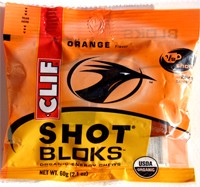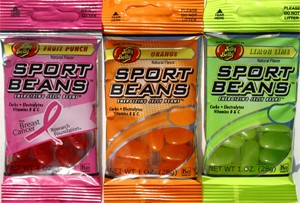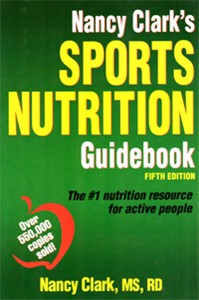|
Energy Chews
Author:
Stan Reents, PharmD
Original Posting:
01/07/2019 09:17 AM
Last Revision: 01/08/2019 05:42 AM
Documentation that carbohydrates and fats are important sources of energy for muscles was first reported way back in 1920! (Krogh A, et al. 1920).
And, it's also been well-established that endurance exercise lasting longer than 60 minutes substantially depletes the carbohydrate (aka: glycogen) reserves in the liver and skeletal muscles (Wallis GA, et al. 2006). So, it's only logical to expect that, if you ingest carbs during prolonged exercise, this should keep you from "hitting the wall," as they say.

The evolution of commercial sports nutrition products progressed as follows:
- 1965: Gatorade became the first sports drink.
- 1986: PowerBars first marketed.
- 1990's: GU and other carbohydrate gels marketed.
- 2005: Chewable forms of rapidly-absorbed carbohydrates - Sport Beans and Clif Shot BLOKS - were created.
These chewable products were an attempt to provide athletes and weekend warriors with even more convenient forms of carbohydrates that they could carry and consume during a race.
If you're a serious endurance athlete, or just going on a long hike, these products are worth considering.
WHAT'S THE RECOMMENDED AMOUNT OF CARBS TO CONSUME DURING EXERCISE?
Before we get to specific products, we need to clarify how much carbohydrate to consume while competing or exercising. Here is what Nancy Clark, MS, RD, recommends on p. 196 of her book "Sports Nutrition Guidebook, 5th ed":
DURATION AND INTENSITY
OF EXERCISE |
CARBOHYDRATE NEEDED |
| • less than 45 minutes |
none |
| • 1 - 2.5 hrs |
30 - 60 grams per hr |
• more than 2.5 hrs,
low-to-moderate intensity |
30 grams per hr |
• more than 2.5 hrs,
moderate-to-high intensity |
60 - 90 grams per hr |
Sports nutrition experts state that, for endurance exercise/races that last less than 45-60 minutes, you don't need to consume any carbs...ie., you can just rely on the carbohydrates (glycogen) you already have stored in your muscles and liver.
While that statement is true, why not consume some carbs during exercise lasting less than an hour? In other words, why wait until your glycogen reserves get depleted? I suppose, if you're a fast runner and it's a short race like a 5-K, then, you may not want to risk disrupting your rhythm and breathing by trying to gulp down a gooey energy gel or chewing several energy cubes.
In that case, consume them a few minutes before the race starts!
CARBOHYDRATES IN CHEWABLE SPORTS NUTRITION PRODUCTS
The types of carbs found in these chewable products are the same as those found in energy gels:
Simple Sugars
Glucose, fructose, and sucrose are considered "simple" sugars because they are small molecules. As such, they are rapidly-absorbed. Research has shown that consuming them in combination is more beneficial during exercise than consuming glucose only or fructose only. This is why pretty much all sports nutrition products contain a mixture of sugars.
Maltodextrin
Maltodextrin is a string of glucose molecules. It can consist of anywhere from 3 to 17 glucose units, though generally it contains about 5. Even though it is a larger molecule than the simple sugars listed above, maltodextrin is rapidly broken down into individual glucose molecules and readily absorbed.
ARE CARBOHYDRATES IN SOLID FORM AS EFFECTIVE AS LIQUID FORM?
A practical issue to consider is if carbs ingested in a solid form like these chewable products achieves the same result as when you consume liquid carbs from sports drinks. It's logical to assume that solid forms might take longer to digest.
No worries, mate! Researchers in Australia (Mason WL, et al. 1993) and in the UK (Pfeiffer B, et al. 2010) compared the effect of carbohydrates consumed as a bar to liquid carbs and found no difference.
SPECIFIC CHEWABLE PRODUCTS
• BLOKS Energy Chews (by Clif Bar, www.ClifBar.com): In August 2005, Clif Bar produced "Clif Shot BLOKS" (see image at the beginning of this article). This product is now named "BLOKS Energy Chews." One pack of "BLOKS" contains 6 pieces, which provides 48 g carbohydrates and 200 calories. A full pack also provides 100 mg sodium and 40 mg potassium, but no protein, amino acids, or vitamins. As of January 2019, BLOKS come in 11 flavors: black cherry, citrus, cran-razz, ginger ale, margarita, mountain berry, orange, salted watermelon, spearmint, strawberry, and tropical punch. Two flavors (orange, tropical punch) contain 50 mg caffeine per pack. Two other flavors contain boosted amounts of sodium: salted watermelon 200 mg per pack; margarita 300 mg per pack.
• Endurance Carb Energy Chews (by Gatorade, www.Gatorade.com): One pack contains 4 squares. Each pack provides 31 grams of carbs, 120 calories, sodium 110 mg, and potassium 55 mg, but no protein, amino acids, or caffeine. This product does contain vitamins: B6, niacin, and pantothenic acid. As of January 2019, they are available in 2 flavors: fruit punch, and orange.
• Sport Beans (by Jelly Belly, www.SportBeans.com): Jelly Belly is the company that brought you jelly beans. In 2005, they created Sport Beans.  A single pack contains 25 g of carbohydrate from cane sugar (sucrose) and tapioca syrup (glucose, fructose), which provides 100 calories. Sport Beans also contain 80 mg sodium and 40 mg potassium, and small amounts of the water-soluble vitamins thiamine, riboflavin, niacin, and vitamin C. They do not contain protein or amino acids. According to their marketing literature, Sports Beans are for people "engaged in prolonged exercise of 60 minutes or longer." They recommend 1 pack (with water) 30 minutes before exercise, and then roughly 1 packet (with water) for every 45 minutes of activity. As of January 2019, Sport Beans are available in 7 flavors, none of which contain caffeine: berry, fruit punch, green apple, juicy pear, lemon-lime, orange, and assorted. They also offer "Extreme Sport Beans." These contain 50 mg caffeine per pack and are available in 5 flavors. A single pack contains 25 g of carbohydrate from cane sugar (sucrose) and tapioca syrup (glucose, fructose), which provides 100 calories. Sport Beans also contain 80 mg sodium and 40 mg potassium, and small amounts of the water-soluble vitamins thiamine, riboflavin, niacin, and vitamin C. They do not contain protein or amino acids. According to their marketing literature, Sports Beans are for people "engaged in prolonged exercise of 60 minutes or longer." They recommend 1 pack (with water) 30 minutes before exercise, and then roughly 1 packet (with water) for every 45 minutes of activity. As of January 2019, Sport Beans are available in 7 flavors, none of which contain caffeine: berry, fruit punch, green apple, juicy pear, lemon-lime, orange, and assorted. They also offer "Extreme Sport Beans." These contain 50 mg caffeine per pack and are available in 5 flavors.
Here's a side-by-side comparison. (note that BLOKS contain 2 servings per pack):
| INGREDIENT |
CLIF BLOKS
(per pack) |
GATORADE
CHEWS
(per pack) |
SPORT BEANS
(per pack) |
| Carbs |
48 grams |
31 grams |
25 grams |
| Calories |
200 cals |
120 cals |
100 cals |
| Protein |
none |
none |
none |
| Caffeine |
• 9 flavors: none
• 2 flavors: 50 mg |
none |
none** |
| Sodium |
• 9 flavors: 100 mg
• 1 flavor: 200 mg
• 1 flavor: 300 mg |
110 mg |
80 mg |
| Potassium |
40 mg |
55 mg |
40 mg |
| Vitamins |
none |
YES |
YES |
** = regular Sport Beans contain no caffeine; Extreme Sport Beans contain 50 mg caffeine per pack
DO CHEWABLE CARBOHYDRATES ACTUALLY IMPROVE ATHLETIC PERFORMANCE?
If you've read my review of "Energy Gels", you know that there's not much published research on those products.
There's even less research on these chewable forms. Here's the only study that I am aware of:
Sports Beans vs. Energy Gel vs. Sports Drink During Cycling
Researchers from UC Davis compared carbohydrates supplied as jelly beans to a carb-only energy gel and a sports drink (Campbell C, et al. 2008):
Sixteen trained athletes cycled at 75% VO2max for 80 minutes, then performed a 10-km time trial. They consumed 0.6 grams of carbohydrate per kg body weight per hour from one of the 3 products, or, water only, before, during, and after the exercise session.
RESULTS: All 3 carbohydrate sources improved time-trial performance compared to water only. Also, the jelly beans were equivalent to the energy gel and the sports drink in maintaining blood glucose:
CARBOHYDRATE
SOURCE |
TIME-TRIAL
PERFORMANCE |
BLOOD
GLUCOSE |
| Sport Beans |
17.2 min |
5.7 mmol/L |
| Energy Gel |
17.3 min |
5.7 mmol/L |
| Sports Drink |
17.3 min |
5.6 mmol/L |
| Water |
17.8 min |
4.6 mmol/L |
This research suggests that whether carbs are consumed as a solid, a liquid, or a gel, it provides the same benefit.
RECOMMENDATIONS
OK, maybe you've decided to carry some type of chewable carbohydrate with you on your next race or century ride. Which brand is the best?
Here are a couple thoughts:
• I want an energy chew with CAFFEINE: Refer to the table above. Two flavors of Clif's BLOKS contain caffeine, and all of the Sport Beans Extreme contain caffeine.
• I want an energy chew with PROTEIN: Sorry, you're out of luck here. In this case, you'll need to choose an energy gel like Accel Gel.
• I want an energy chew with extra SODIUM: If you'll be perspiring heavily, then consuming extra sodium during and after your race is important. Clif Bar offers 2 flavors of their BLOKS with boosted amounts of sodium.
• What about VITAMINS?: I'm not convinced that you need to consume vitamins during exercise. Afterwards? Perhaps. But not during. Thus, I would avoid products that contain vitamins.
Considering these details, Clif Bar's BLOKS seem like a good choice. You get a larger amount of carbs and calories in each pack. They don't contain vitamins. And if you want caffeine or extra sodium, they offer those options as well!
Regardless of which product you use, definitely see how you respond to it before using it during a race or competition. When carbs are ingested without enough liquid, sometimes, they can cause stomach cramps.
FOR MORE INFORMATION

In 2014, Nancy Clark, MS, RD, published the 5th edition of her popular Sport Nutrition Guidebook. This book has sold over 550,000 copies. She explains how to consume carbohydrates before and during exercise in Chapter 9, though specific chewable forms of carbs are not discussed.
Readers may also be interested in these reviews:
EXPERT HEALTH and FITNESS COACHING
Stan Reents, PharmD, is available to speak on this and many other exercise-related topics. (Here is a downloadable recording of one of his Health Talks.) He also provides a one-on-one Health Coaching Service. Contact him through the Contact Us page.
REFERENCES
Backhouse SH, Bishop NC, Biddle SJH, et al. Effect of carbohydrate and prolonged exercise on affect and perceived exertion. Med Sci Sports Exerc 2005;37:1768-1773. Abstract
Burke LM, Wood C, Pyne DB, et al. Effect of carbohydrate intake on half-marathon performance of well-trained runners. Int J Sport Nutr Exerc Metab 2005;15:573-589. Abstract
Campbell C, Prince D, Braun M, et al. Carbohydrate-supplement form and exercise performance. Int J Sport Nutr Exerc Metab 2008;18:179-190. Abstract
Krogh A, Lindhard J. The relative value of fat and carbohydrate as sources of muscular energy. Biochem J 1920;14:290-363. Abstract
Leelayuwat N, Tsintzas K, Patel K, et al. Metabolic responses to exercise after carbohydrate loads in healthy men and women. Med Sci Sports Exerc 2005;37:1721-1727. Abstract
Mason WL, McConell G, Hargreaves M. Carbohydrate ingestion during exercise: Liquid vs solid feedings. Med Sci Sports Exerc 1993;25:966-969. Abstract
Pfeiffer B, Stellingwerff T, Zaltas E, et al. Oxidation of solid versus liquid CHO sources during exercise. Med Sci Sports Exerc 2010;42:2030-2037. Abstract
Pfeiffer B, Stellingwerff T, Zaltas E, et al. CHO oxidation from a CHO gel compared with a drink during exercise. Med Sci Sports Exerc 2010;42:2038-2045. Abstract
Wallis GA, Dawson R, Achten J, et al. Metabolic response to carbohydrate ingestion during exercise in males and females. Am J Physiol Endocrinol Metab 2006;290:E708-E715. Abstract
ABOUT THE AUTHOR

Stan Reents, PharmD, is a former healthcare professional. He is a member of the American College of Lifestyle Medicine (ACLM) and a member of the American College of Sports Medicine (ACSM). In the past, he has been certified as a Health Fitness Specialist by ACSM, as a Certified Health Coach by ACE, as a Personal Trainer by ACE, and as a tennis coach by USTA. He is the author of Sport and Exercise Pharmacology (published by Human Kinetics) and has written for Runner's World magazine, Senior Softball USA, Training and Conditioning and other fitness publications.
DISCLOSURE: Neither the author, nor AthleteInMe, LLC, has any relationship with any of the products or manufacturers mentioned in this review.
Browse By Topic:
carbohydrates, energy bars, energy chews, energy gels, nutrition recommendations, sports nutrition
Copyright ©2024 AthleteInMe,
LLC. All rights reserved.
|